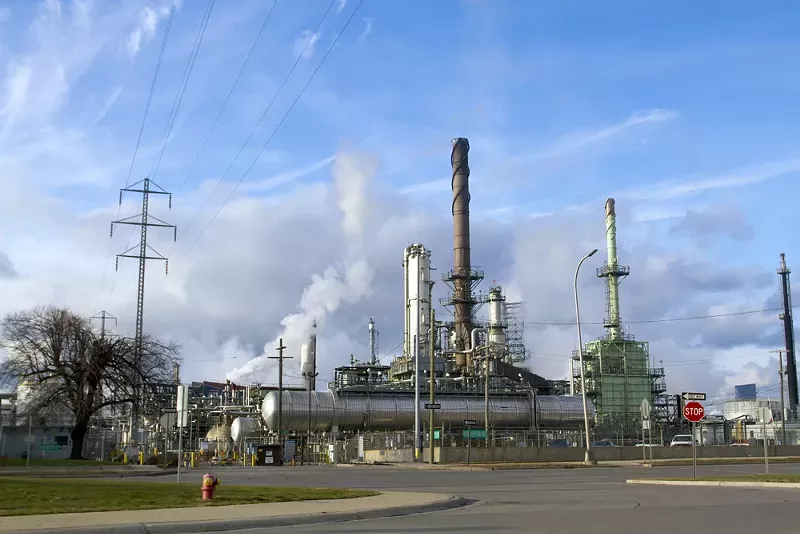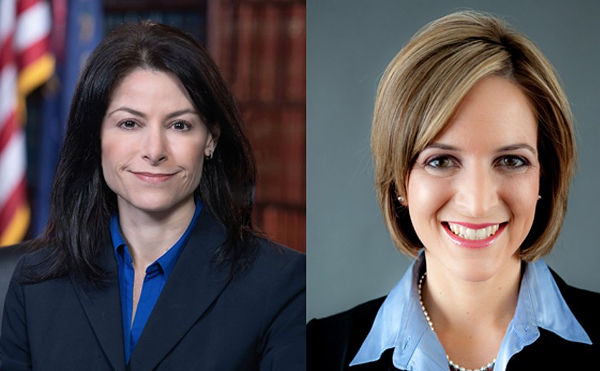Tlaib introduces bill aimed at curtailing environmental racism
In Michigan and other states, polluters are often concentrated in communities of color

Audio By Carbonatix
[
{
"name": "GPT - Leaderboard - Inline - Content",
"component": "35519556",
"insertPoint": "5th",
"startingPoint": "3",
"requiredCountToDisplay": "3",
"maxInsertions": 100,
"adList": [
{
"adPreset": "LeaderboardInline"
}
]
}
]

Steve Neavling
Marathon Petroleum Co. in southwest Detroit.
U.S. Rep. Rashida Tlaib introduced a bill intended to protect communities that are overburdened by air and water pollution, which are often concentrated in communities of color.
The Cumulative Impacts Act, introduced on Friday, would require the Environmental Protection Agency to analyze the total effect of permitting decisions under the Clean Air Act and Clean Water Act.
If approved, the EPA would be required to deny new permits to companies that would add more pollution to frontline communities.
“For far too long, corporate polluters have poisoned Black, brown, Indigenous and low-income communities—putting profits over people’s lives,” Tlaib, a Detroit Democrat, said in a statement Wednesday. “I will not remain silent while the health of our neighbors living in frontline communities is continuously sacrificed for corporate greed.”
Pollution is a widespread problem in the majority-Black city of Detroit. The University of Michigan School of Public Health estimates that air pollution kills more than 650 Detroiters a year — more than twice the number of residents killed by gun violence annually. Thousands more are hospitalized, and children miss a disproportionate number of days at school because of illnesses and asthma.
Numerous studies have shown that Black communities nationwide are disproportionately exposed to industrial air pollution. Black Americans, for example, are 75% more likely to live near industrial facilities than white people, according to “Fumes Across the Fence-Line,” a 2017 study by the National Medical Association, the Clean Air Task Force, and the National Association for the Advancement of Colored People.
The study estimates that nearly 2,500 children a year in Detroit have asthma attacks linked to air pollution.
“We all deserve to breathe clean air and drink clean water,” Tlaib said. “This legislation will protect and empower our frontline residents living with the devastating effects of climate change and fossil fuel development. The EPA’s permitting process must be evaluated by the cumulative impact on vulnerable communities. It’s past time we begin to repair the decades of environmental racism and disinvestment in communities of color.”
The bill comes two months after Tlaib hosted a congressional field hearing at Wayne County Community College’s Eastern Campus in Detroit. At the hearing, residents in heavily polluted neighborhoods complained of living with sore throats, burning eyes, trouble breathing, and organ problems.
One of the main problems, environmental activists said, is that regulators allow each pollution-spewing facility to emit a certain amount of contaminants, regardless of the level of toxins already in the air from adjacent factories. The cumulative impact can be devastating, they said.
Metro Times examined the exorbitant levels of pollution in predominantly Black communities in 2020 and found that companies are given permits to contaminate the air and water even though residents are already inundated with pollution.
In the state’s most polluted ZIP code, 48217 in Southwest Detroit, there are more than three dozen pollution-spewing facilities. The community is inundated with a toxic stew of chemicals wafting from steel mills, coal-fired power plants, gas flares, billowing smokestacks, towering piles of coal and petroleum coke, a salt mine, wastewater treatment plant, and one of the nation’s largest oil refineries — all looming over schools, neighborhoods, parks, senior centers, and a recreation center.
“As a resident living in a frontline community, cumulative impacts are one of the most important considerations when it comes to reducing pollution,” said Theresa Landrum, a community advocate in 48217. “This legislation is greatly needed to protect the life and well-being of our residents. Our community is one of hundreds across Michigan that needs stronger protections from the federal government, whether it be pollution in the air, land, or water. We must look at it wholistically. All of these pollutions come together to harm human health and life.”
Kathryn Savoie, director of Equity and Environmental Justice at the Ecology Center, called the bill “an historic step toward environmental justice.”
“It’s critically important that the EPA assess cumulative impacts of pollution, which will lead to better decisions that improve the health and quality of life of overburdened communities,” Savoie said.
Stay connected with Detroit Metro Times. Subscribe to our newsletters, and follow us on Google News, Apple News, Twitter, Facebook, Instagram, Reddit, or TikTok.






